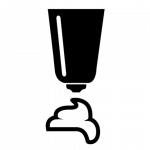The 105 people of Khabalwe Community need a safer water source. They consistently suffer from water-related illnesses from consuming the contaminated water of their local spring. This steals their health and resources, making it difficult for them to make progress in their daily lives.
"The waterpoint is an unprotected spring with a very high chance of one getting or contracting waterborne illnesses because the spring is open to contamination, and the community members use a jug for them to scoop water and collect it into their containers," shared Field Officer Joy Ongeri.

Children collect water from the unprotected spring.
Thirty-two-year-old Coleta Nafuna is a farmer, wife, and mother who is familiar with the struggle of persistent illnesses from drinking dirty water.

Coleta at the spring.
"The water is not safe for drinking, and we often get sick if we do not boil our water," said Coleta.
"One of my sons and my husband have ever had a stomach upset because they drank the water without treating it, and they had to stay at home and miss school and work. I had to take care of them and make sure they get better."
When one family members fall ill, it puts the whole house on pause. Being farmers, every moment not spent working their livelihoods eats into their potential income. Without reliable income, they struggle to meet their needs. It's a hard way to live.
"The illness caused my family to really struggle because my husband is the one who brings most of the income, and with the little we had, we had to survive with it, which was not easy. My husband did not go to work, which caused us [to] lack income, and we even used the money for buying medication, and we had [a] hard time."
"I do not like drinking water from this source and do not trust it is safe, so I boil it so that it won't harm my family because we don't have clean and safe water at the moment."
Coleta and her family need access to clean, safe water. She dreams of a future with water access that will allow her to regain her energy so she can commit time to her farming, helping provide security to her family.

Coleta.
"If there will be a waterpoint, we will be able to get clean and safe water, where we will not suffer from waterborne illnesses," said Coleta.
Coleta has the determination to thrive, and when given access to safe water, she will have the tools to do so!
"As a farmer, I will be able to use my time to grow more plants and improve my farm and also more time to concentrate on my household like rearing poultry and improving my house," she concluded.
Steps Toward a Solution
Our technical experts worked with the local community to identify the most effective solution to their water crisis. They decided to safeguard the existing flowing spring.
Spring Protection
Springs are natural water sources that originate from deep underground. As water travels through various layers of the earth, it undergoes a natural filtration process, making it cleaner and safer to drink. To protect these spring sources from contamination, we construct a waterproof cement structure around layers of clay, stone, and soil. This design channels the spring water through a discharge pipe, facilitating easier, faster, and cleaner water collection.
Chlorine Dispenser
As an extra measure towards water quality safety, uniquely engineered chlorine dispensers are installed at all of our spring protection projects so community members can treat their water with pre-measured doses of chlorine. The chlorine treats any residual contamination and stays active for two to three days, ensuring water stays safe to use even when stored at home. Chlorine delivery and maintenance of the dispensers are part of our ongoing community support.
Community Education & Ownership
Hygiene and sanitation training are integral to our water projects. Training is tailored to each community's specific needs and includes key topics such as proper water handling, improved hygiene practices, disease transmission prevention, and care of the new water point. Safe water and improved hygiene habits foster a healthier future for everyone in the community. Encouraged and supported by the guidance of our team, a water user committee representative of the community's diverse members assumes responsibility for maintaining the water point, often gathering fees to ensure its upkeep.

 Protected Spring
Protected Spring
 Rehabilitation Project
Rehabilitation Project
















